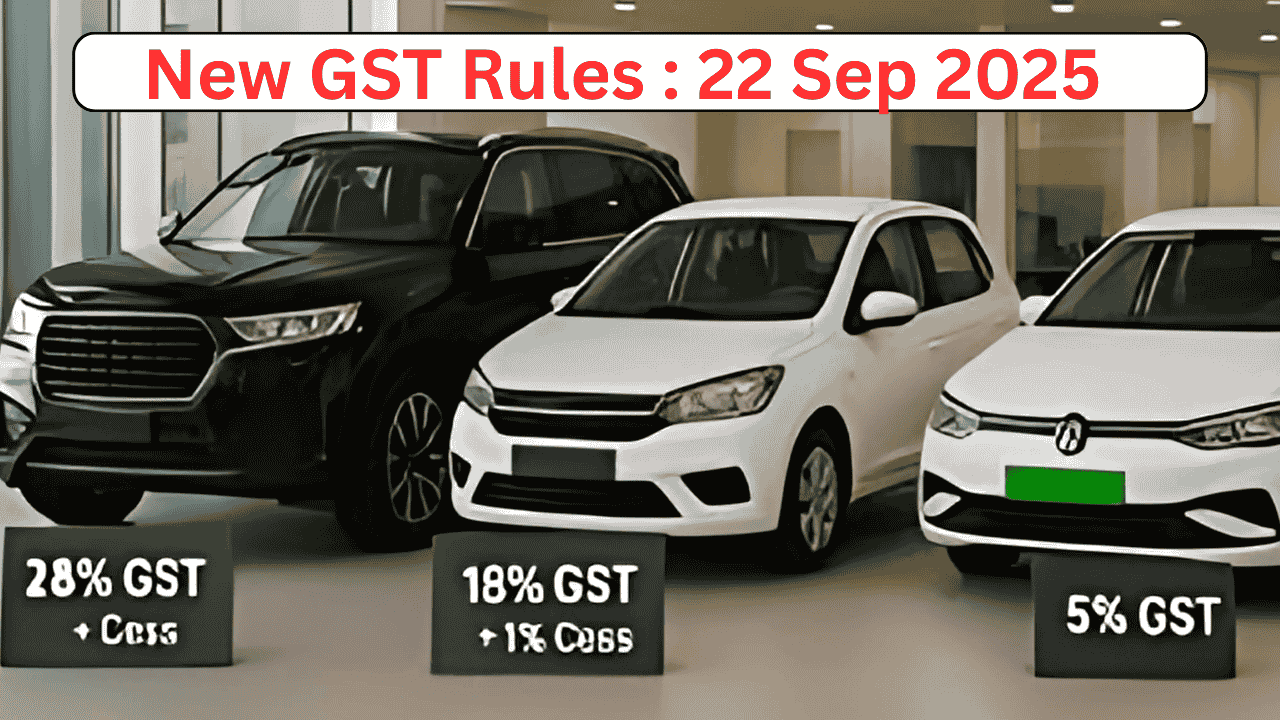Buying a car in India has always been influenced by taxes, and the Goods and Services Tax (GST) plays a central role in deciding final prices. The GST Council frequently revises rates to balance revenue collection and affordability for consumers.
In September 2025, during the 56th GST Council meeting, major changes were announced for the automobile sector. These updates made small cars and hybrids more affordable while luxury cars and larger hybrids became costlier. The revised GST rates are effective from 22nd September 2025, impacting new buyers and the auto industry at large.
- Inflation Refund Check 2025
- 8th Pay Commission DA Hike 2025
- Chime Settlement 2025 Payout Per Person
- Inflation Refund Check 2025
- 401k Contribution Limits 2026
- USA Rental Property Investment Plan 2025
Latest GST Rates on Cars in 2025
The new GST structure varies by car type, engine capacity, and size. Here’s a breakdown of the most recent updates:
| Vehicle Category | Old GST + Cess | New GST Rate |
|---|---|---|
| Petrol, LPG, or CNG cars (≤1200cc & ≤4000mm) | 28% + 1% Cess | 18% |
| Diesel cars (≤1500cc & ≤4000mm) | 28% + 3% Cess | 18% |
| Small hybrid cars (≤1200cc petrol / ≤1500cc diesel, ≤4000mm) | 28% + 1–3% Cess | 18% |
| Luxury cars & larger hybrids (beyond small car threshold) | 28% + 15–22% Cess | 40% |
| Electric cars (all categories) | 5% | 5% |
| Imported cars (any category) | IGST + Customs Duty | Higher cost depending on import duty |
Impact of GST Rate Reduction on Small Cars
The revised GST rates are particularly favorable for small cars. Petrol and diesel models below the prescribed engine and length limits now attract 18% GST instead of 28%, resulting in significant savings for budget-conscious buyers.
For example:
- A petrol car priced at ₹5 lakh earlier attracted ₹1.45 lakh in taxes.
- Under the new 18% GST, the tax burden reduces to just ₹90,000.
This change aims to encourage mass adoption of affordable cars, especially in the small and hybrid segment.
GST on Luxury Cars and Hybrids in 2025
While small cars got cheaper, luxury vehicles and larger hybrids now attract a higher 40% GST, making them more expensive. This move is designed to ensure higher tax contributions from premium buyers while supporting affordability for middle-class consumers.
GST on Electric Vehicles (EVs) 2025
Electric cars continue to enjoy the lowest GST rate of 5%. The government has retained this rate to push for greener mobility and faster adoption of EVs. This is consistent with India’s long-term focus on reducing carbon emissions and promoting sustainable transport.
Key Highlights of New GST Rates
- Small petrol and diesel cars are more affordable with a reduced 18% GST.
- Luxury cars and larger hybrids face a steep increase, now at 40% GST.
- EVs remain at 5% GST, keeping them attractive for eco-conscious buyers.
- Imported cars still draw IGST plus customs duty, keeping prices high.
Benefits for Car Buyers
The latest GST changes provide multiple advantages:
- Lower upfront costs on small cars and hybrids, encouraging affordability.
- Encouragement for sustainable vehicles, as EVs continue at a low tax rate.
- Predictable pricing, as GST replaces multiple cascading taxes.
FAQs on New GST Rates for Cars
Q1. What is the GST rate on small petrol and diesel cars in 2025?
Ans. Small petrol cars (≤1200cc, ≤4000mm) and small diesel cars (≤1500cc, ≤4000mm) are taxed at 18%.
Q2. Are electric vehicles still taxed at 5% GST?
Ans. Yes, electric cars continue to be taxed at only 5% GST, making them the most affordable segment tax-wise.
Q3. Why are luxury cars now taxed at 40%?
Ans. The government raised GST on luxury and larger hybrids to ensure higher revenue from premium buyers while making small cars affordable for the masses.
Conclusion
The new GST rates on cars in 2025 reflect a clear policy direction—make small cars and eco-friendly vehicles more affordable, while luxury and larger hybrids contribute more through higher taxes. For consumers, this means substantial savings on budget cars and hybrids, while luxury car buyers will see steeper price tags.

